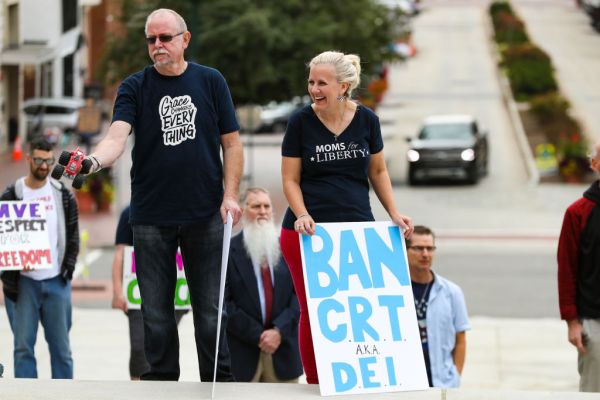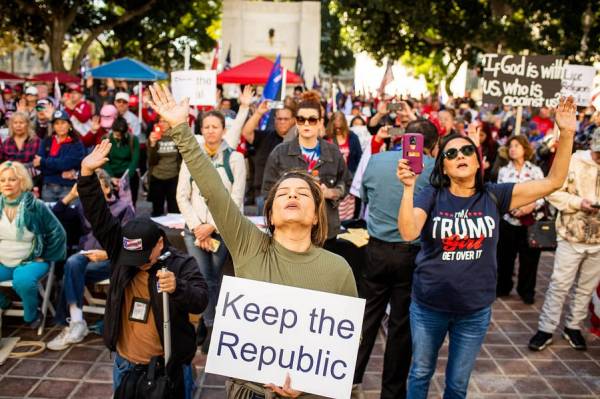Happy Sunday! As we head into election season, a lot of folks—including some whose names you probably recognize—are talking about how to apply their values to how they vote. Sometimes those values are more philosophical or ideological; sometimes they are expressly theological.
Whichever values one chooses to to prioritize, the most lucid commentators seem to understand that the aspiration to implement those values will eventually butt up against reality: Any political choice comes with trade-offs, and no one candidate, be it in the 2024 presidential election or any other election, will be a pure distillation of our individual value commitments. That’s not how the American system of governance works.
Thus, hijinks balancing acts ensue.
One of the most discussed topics among the pundit class in the last few years is the degree to which socially conservative Christians should seek to implement their values on the rest of the country via exercising political power. In today’s Dispatch Faith, Georgetown University professor Paul D. Miller argues that a genuine love of their neighbor compels Christians to “vote their values,” but government can only do so much in effectively implementing those values because much of that work must be done by the church—not the state.
Paul D. Miller: Yes, You Can Vote Your Values, But …

As in the past two presidential elections, Donald Trump has again made outreach to Christian voters central to this year’s campaign. “Christians, get out and vote,” he said at a campaign event in July. “I love you Christians. I’m a Christian. I love you,” he repeated, calling the crowd “my beautiful Christians.”
In response to Trump’s appeal for Christians to vote for their interests, many critics, including me, have warned against the dangers of Christian nationalism. Christian nationalism turns our faith into just another tribal interest group rather than the voice and body of Christ on earth. It plays the game of identity politics. It blurs the line between church and state, and more.
If Christian nationalism is bad, how then shall we vote? Surely, Christians are allowed to vote for what we believe, aren’t we? Shouldn’t Christians pursue justice in the public square? Don’t we have a responsibility to attain power, not for its own sake, but to use it to advance good in society? Isn’t that, in some sense, working to advance a Christian moral vision for our nation?
In other words, aren’t we allowed to vote our values?
The short answer is “yes, but …” A slightly longer answer: “Usually yes, in principle, but it depends on what you mean by ‘values,’ how you intend to implement them, and what your heart motive is.” Let’s take a closer look at each of those components.
First, “yes, in principle.” Christians should work for peace, justice, and flourishing, and these are definitely “Christian values.” We should “seek the welfare of the city,” (Jeremiah 29:7), we should “do justice” (Micah 6:8), and pray that our rulers’ “throne is established by righteousness” (Proverbs 16:12), because “righteousness exalts a nation, but sin is a reproach to any people” (Proverbs 14:34).
And as citizens in a democracy, we have a unique privilege and responsibility most Christians in history lacked: we are the ruler, as well as the ruled. Most Christians in past ages could only pray for wise and just kings. But today we vote, we can run for office, and our individual righteousness is part of the overall righteousness of our nation and influences the decisions we make when we vote for candidates and laws.
Does that mean we should seek a Christian takeover and impose Christian moral rules through the government? Of course not: One of our Christian principles is recognizing and respecting the boundaries God has established for civil government. Government exists for a specific, limited purpose: to keep the peace and uphold justice, to the extent possible in a fallen world.
And so we pursue justice, but not theocracy. We work for social flourishing, but not a Christian takeover. Christians share a world with those who do not recognize King Jesus, who desires that we bring them into the kingdom through acts of mercy, not conquest.
This is a difficult balance in practice, and American Christians have sometimes gotten it wrong. Let me suggest three guidelines to follow when we vote our values.
First, our values should not be discriminatory. Past generations of American Protestants believed very strongly that they had to protect their values by prohibiting atheists and Catholics from public office. Other Christians appealed to the Bible in defense of slavery and segregation. Their “values” were discriminatory, rooted not in equal justice for all, but protecting white Protestants’ social dominance. Invoking our values can be a tempting fig leaf behind which we vote for social privilege.
Second, sometimes turning our values into public policy is politically and administratively impractical. More than a century ago, American Protestants succeeded in passing the 18th Amendment to the Constitution, prohibiting the manufacture, sale, or transportation of alcohol. Never mind that other groups of Christians had differing stances on alcohol. Prohibition backfired spectacularly, incentivizing a massive black market that enriched powerful organized criminal networks and fueled a decade of gang warfare on American streets. And (spoiler) people still drank.
Our “values” are often not nearly as popular as we like to think, and the government is not nearly as competent as enforcing them as we’d like to hope. Having worked for the government for a decade, I have a very low estimate of what it can do. I also have a very keen awareness for unintended consequences—what economists call “negative externalities”—and the likelihood that today’s solutions create more problems for tomorrow.
Third, we must respect the fine line between championing values and using the government to sponsor our religion. We must protect the church’s prerogative to be the sole authorized representative of Christ on earth. American public schools used to include teacher-led Bible study and prayer, and many American Christians today want to bring them back to protect our values. But that amounts to outsourcing the church’s prerogative to Caesar, letting the government teach in the name of Jesus. In practice, that always distorts the gospel and compromises the church’s independence—Caesar makes a terrible Sunday School teacher.
Jesus reminded us that “My kingdom is not of this world” (John 18:36). He gave the keys of the kingdom to his apostles (Matthew 16), signifying the church’s authority to mediate his reign on earth, an authority that civil government may not usurp. God has not authorized civil government to regulate worship of himself.
Today, Christians on the political right talk about voting our values regarding abortion, the family, and religious liberty. Some have called for cracking down on pornography and voluntary drag shows at public libraries and mandating the public display of the Ten Commandments.
I share the desire for greater public morality and public decency. But we must be careful. Take drag shows at public libraries. We have every right to expect that public libraries should uphold a family-friend code of public decency. If “no shoes, no shirt, no service,” is a basic standard in any store or restaurant in America, it should be easy to agree that stripteases, nudity, and other explicitly sexual shows do not belong in a public library.
But that does not mean we can prevent a group from using the library or reserving event space for a voluntary event there just because we disagree with their ideas about human sexuality. Both the Golden Rule and the possibility of creating new legal precedents counsel an ethic of reciprocal altruism: Whatever we do to them this year, they’ll do to us the next. We have to draw a careful line between regulating behavior and banning speech or expressive activity. So long as any group abides by a code of conduct—such as rules about public decency I mentioned above—there are no grounds for denying them access to a public resource like the library.
We also must be careful about the practical implications of the policies we espouse. For example, there are strong arguments for cyber-zoning pornography—mandating that pornographic content be limited to a dedicated internet domain name so that it is easier for browsers and computers to block it. But banning pornography outright—criminalizing the entire industry—is probably too technologically and administratively difficult, would create a vast and powerful enforcement apparatus (does anyone trust the FBI to surveil every laptop and smartphone in the nation?), and, like Prohibition, create a lucrative black market that would fund other criminal activity.
Cyber-zoning is not as emotionally satisfying and lacks the punch of calls to “ban porn!” but is a more prudent and feasible approach (and would still be a vast improvement over the Wild-West lawlessness that surrounds internet porn today). Incrementalism—implementing small changes gradually instead of sweeping changes all at once—is an oft-unrecognized face of wisdom, especially in a democratic society.
Finally, we should respect the boundaries between church and state. The public display of the Ten Commandments is a perfectly framed issue for illustrating where the line should be drawn. Theologians often recognize a distinction within the Ten Commandments between the “First Table” (Commandments 1-4) and “Second Table” (Commandments 5-10).
The First Table regulates the relationship between God and man: have no other gods; don’t worship idols; don’t take God’s name in vain; honor the sabbath. The Second Table regulates the relationships between and among humans: honor your parents; don’t murder, lie, steal, commit adultery, or envy. The First Table is outside the jurisdiction of civil government; the Second is fully within it.
Post the Second Table anywhere and everywhere, including in public schools and courtrooms: It expresses a universal natural law upon which every religion, philosophy, and civilization in history has agreed. There are simply no grounds on which to object to teaching children in public schools not to lie, steal, or murder.
But keep your government hands off the First Table. Posting it is tantamount to an establishment of religion. No government has any business posting commandments about which God to worship and how to worship Him. That is a violation of the state’s jurisdiction, a usurpation of the church’s authority, and an infringement on the First Amendment.
Christians in a democracy are not called to withdraw and cede the public square to others, nor to take over and resurrect Christendom. We can vote our values, but we should be careful that our values are neither sectarian nor discriminatory; that we don’t overestimate what government is capable of; and that we respect the church’s independence and the state’s boundaries. We are to love our neighbors by working for equal justice and common flourishing—nothing more, and nothing less.
More Sunday Reads
- For Mosaic, art historian Jacob Wisse explored in great detail how so much of Western art in the last 2,000 years comes from the Hebrew Bible—what Christians refer to as the Old Testament—and how many of those predominantly Christian interpretations diverge from Jewish theology. “If one is interested in understanding art as an expression of human achievement and cultural progress, one has to contend with the role of Christianity in the development of the artistic tradition. In turn, one is likely to be surprised by what one finds: an artistic tradition that is unimaginable without the Hebrew Bible and that can reveal deep truths about Hebrew Scripture and Jewish ideas,” Wisse wrote. “It strikes me—and now I am speaking primarily as an art historian—that the depth, magnitude, and quality of Hebrew Bible’s influence on Western art have not been sufficiently or properly understood. While the narrative and symbolic use of biblical subjects has long been recognized, little attention has been paid to how the character and vision of the Hebrew Bible seem to pervade the Western visual tradition.”
- Two weeks ago we published a review of evangelical writer Megan Basham’s Shepherds for Sale by Warren Cole Smith. Today, The Dispatch’s Kevin Williamson adds his own critical assessment of the book to the zeitgeist, in ways only Kevin can. “This is a book about, and for, Christians, which means there is something on the table more important than journalistic incompetence,” he writes. “There is the matter of bearing false witness. Megan Basham has some apologies to make and a public record to correct. Judgment, I am reliably informed, comes like a thief in the night.”
- One of the groups to suffer the most in the three-year civil war in Burma (referred to by some as Myanmar) has been the Rohingya, a predominantly Muslim ethnic minority in the largely Buddhist country. For Voice of America, Shaikh Azizur Rahman reports on the latest allegations of ethnic cleansing there. “Myanmar’s Rohingya ethnic minority, victims of a brutal campaign of mass slaughter and persecution by the nation’s military in 2016, is again being subjected to a wave of deadly ethnic cleansing, according to survivors and human rights groups,” Rahman writes. “This time, though, the perpetrators are said to be the Arakan Army, one of several ethnic groups fighting the nation’s ruling junta, as well as by their former military persecutors. ‘Ethnic Rohingya and Rakhine civilians are bearing the brunt of the atrocities that the Myanmar military and opposition Arakan Army are committing,’ Elaine Pearson, Asia director of Human Rights Watch, said in a report this week that accused both the AA and junta forces of ‘extrajudicial killings and widespread arson against Rohingya’ and other civilians.”
A Different Kind of Sunday Show
We’re excited to announce a new component of Dispatch Faith: recorded conversations between me and Dispatch Faith contributors about their work here and matters of faith generally, available on our YoutTube channel. Our first guest was Jake Meador, who two weeks ago wrote about the transformation of postliberalism among religious conservatives. The goal is to go deeper on particular subjects than what we can in Dispatch Faith and to discuss other interesting and related issues along the way. We hope you’ll enjoy it—and feel free to share!
A Good Word
Thanks for indulging me as I change up this segment a bit, but I’ve had this song from one of my all-time favorite bands stuck in my head all week. Story and song can embed themselves in our hearts and minds like nothing else (there’s a reason Christians are implored to sing the psalms to one another), and all week I’ve wondered which of the two characters in “The Ballad of Love and Hate” I’ve embodied more in my roles as husband, as father, as son, as brother, and even as coworker. The song, from the Avett Brothers, is indeed a good word.









Please note that we at The Dispatch hold ourselves, our work, and our commenters to a higher standard than other places on the internet. We welcome comments that foster genuine debate or discussion—including comments critical of us or our work—but responses that include ad hominem attacks on fellow Dispatch members or are intended to stoke fear and anger may be moderated.
With your membership, you only have the ability to comment on The Morning Dispatch articles. Consider upgrading to join the conversation everywhere.